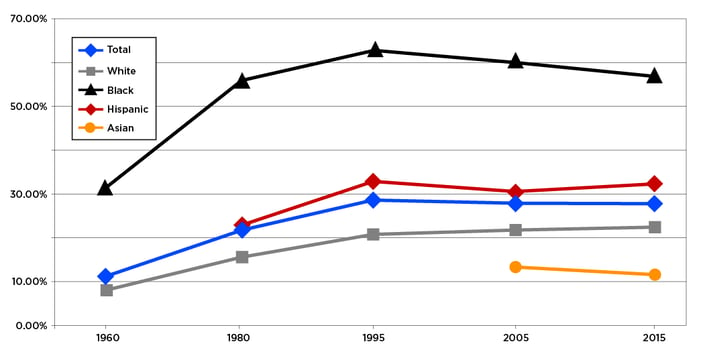Has Father Absence Gotten Better or Worse?
2 min read
Date Published: 10/17/2017
Last Updated: 01/03/2018
National Fatherhood Initiative Blog / Latest Articles
2 min read

Neither.
That’s right. For the past two decades, the proportion of children who grow up without a biological, step, or adoptive dad has remained stable at 27.5 percent.
Percentage of Children in Father-Absent Homes, 1960-2014

Source: U.S. Census Bureau
Is this good news or bad news?
It’s certainly good news that the proportion of children who grow up without a dad hasn’t gotten worse. It’s also good news that the proportion of Black children who grow up without a dad has decreased, although, sadly, these children still far outpace any other racial group.
When it comes to children’s well-being, however, there’s no doubt that it’s bad news. On average, when children grow up with their dad, they reap physical, emotional, and social benefits too numerous to mention here. By contrast, when children grow up without their dad, they suffer, on average, from a number of ills.
Although the proportion of children growing up without a dad has stabilized, the sheer number of these children has increased. There were 69.5 million children under the age of 18 in 1995. That number increased to 73.8 million in 2017. That means just under 1.2 million more children today—27.5 percent of the additional 4.3 million children—grow up without a dad.
The bottom line is that all of us still have a lot of work to do to decrease the proportion of children who grow up without a dad. I implore you to continue to partner with National Fatherhood Initiative as we build capacity in organizations and communities to connect dads with their children.
Date Published: 10/17/2017
Last Updated: 01/03/2018
Download the ebook to learn how to create fatherhood initiatives that engage every sector of community life.

Train Your Staff
Fatherhood Programs
Fatherhood Data
© 2025 National Fatherhood Initiative®. All rights reserved.